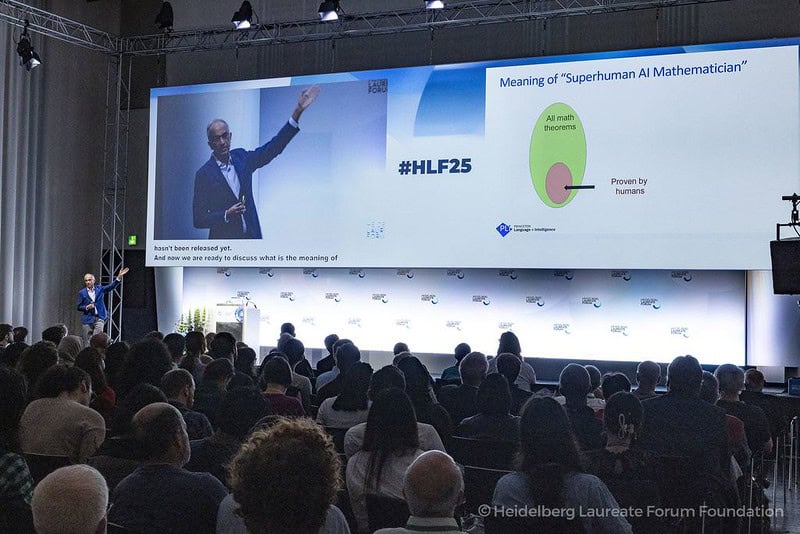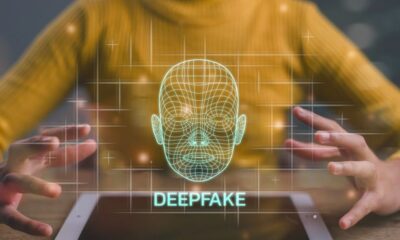Science
AI Mathematicians on the Rise: Insights from Heidelberg Forum

Recent discussions at the Heidelberg Laureate Forum (HLF) have illuminated the growing influence of generative artificial intelligence (AI) on the field of mathematics. Researchers, including those from Microsoft, have identified mathematicians as one of the professions most likely to be transformed by advancements in AI. This revelation has sparked a mix of excitement and concern among the academic community.
AI’s Growing Role in Mathematics
During the HLF, which connects emerging researchers with prominent figures in mathematics and computer science, experts highlighted how AI is already performing tasks traditionally reserved for human mathematicians. Yang-Hui He, a mathematical physicist at the London Institute for Mathematical Sciences, expressed both enthusiasm for AI and apprehension regarding its implications. He has actively promoted the integration of machine-learning techniques in mathematics since 2017 but has recently voiced concerns about generative AI’s capabilities.
“It is doing mathematics so well without any understanding of mathematics,” He remarked during a panel discussion, reflecting a sense of awe mixed with uncertainty. He further questioned, “Where is our place?” This sentiment resonates with many mathematicians grappling with the potential displacement caused by AI technologies.
The Mechanics Behind AI Advancements
The efficiency of current generative AI systems stems from their tireless nature. According to Sanjeev Arora, a theoretical computer scientist, AI’s relentless processing power gives it an edge over human mathematicians. He likened the capabilities of AI to those of a 20th-century mathematician, Alfréd Rényi, who described mathematicians as “machines for turning coffee into theorems.” AI, Arora noted, does not require breaks or sustenance, allowing it to work continuously.
Arora emphasized that AI’s ability to utilize feedback mechanisms, known as reinforcement learning, is particularly advantageous in mathematics. In this approach, an AI model generates multiple solutions to a set of questions, refining its performance based on human feedback. The formalized nature of mathematics, where answers can be definitively categorized as true or false, enables the development of AI “proof assistants.” Arora is currently working on such a tool, named Lean, at Princeton University.
Furthermore, Arora speculated on the future possibilities of AI in mathematics, suggesting that it could not only solve problems but also generate mathematical inquiries, draft research papers, and even peer-review them. Such advancements could streamline processes that previously took months for human mathematicians.
Concerns About Rapid Change
While there is widespread acknowledgment of AI’s potential, not all participants at HLF are fully optimistic. Javier Gómez-Serrano, a mathematician at Brown University, noted that AI has already been producing results in days that would have taken humans significantly longer. “Progress has been quite quick,” he stated, highlighting the pace of innovation.
Maia Fraser of the University of Ottawa raised critical concerns about the rapid changes occurring in the field. She cautioned that advancements may proceed without sufficient reflection on their necessity or implications for human mathematicians. “While we can’t un-invent AI, we do have agency over what we want,” she remarked, urging a thoughtful approach to integrating AI into mathematical practice.
As discussions continue, the central question remains: Do we want a future where AI mathematicians operate independently of human input? He concluded with a note of humor, expressing a desire to see a proof of the Riemann Hypothesis, while suggesting that if humans become “priests to oracles,” it might be an acceptable trade-off for the benefits AI could bring to the field.
The conversations at the HLF reflect a pivotal moment in mathematics, where the intersection of human intellect and artificial intelligence could redefine the landscape of research and discovery. As the dialogue progresses, mathematicians will need to navigate the balance between embracing technological advancements and preserving the human touch that has traditionally defined their discipline.
-

 Entertainment3 months ago
Entertainment3 months agoAnn Ming Reflects on ITV’s ‘I Fought the Law’ Drama
-

 Entertainment4 months ago
Entertainment4 months agoKate Garraway Sells £2 Million Home Amid Financial Struggles
-

 Health3 months ago
Health3 months agoKatie Price Faces New Health Concerns After Cancer Symptoms Resurface
-

 Entertainment3 months ago
Entertainment3 months agoCoronation Street’s Carl Webster Faces Trouble with New Affairs
-

 Entertainment2 months ago
Entertainment2 months agoWhere is Tinder Swindler Simon Leviev? Latest Updates Revealed
-

 Entertainment4 months ago
Entertainment4 months agoMarkiplier Addresses AI Controversy During Livestream Response
-

 Science1 month ago
Science1 month agoBrian Cox Addresses Claims of Alien Probe in 3I/ATLAS Discovery
-

 Entertainment4 months ago
Entertainment4 months agoKim Cattrall Posts Cryptic Message After HBO’s Sequel Cancellation
-

 Entertainment2 months ago
Entertainment2 months agoOlivia Attwood Opens Up About Fallout with Former Best Friend
-

 Entertainment3 months ago
Entertainment3 months agoMasterChef Faces Turmoil as Tom Kerridge Withdraws from Hosting Role
-

 Entertainment4 months ago
Entertainment4 months agoSpeculation Surrounds Home and Away as Cast Departures Mount
-

 World2 months ago
World2 months agoCole Palmer’s Mysterious Message to Kobbie Mainoo Sparks Speculation





















